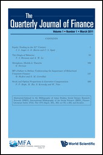
Quarterly Journal of Finance
Scope & Guideline
Fostering Dialogue and Discovery in Financial Research
Introduction
Aims and Scopes
- Innovative Financial Theories:
The journal publishes research that develops new theories in finance, particularly those that can explain market behaviors, pricing mechanisms, and risk management. - Empirical Analysis of Financial Markets:
A strong emphasis is placed on empirical studies that analyze real-world financial data, providing insights into market dynamics, investor behavior, and institutional practices. - Interdisciplinary Approaches to Finance:
The journal encourages submissions that incorporate perspectives from economics, psychology, and sociology to better understand financial phenomena and decision-making. - Corporate Finance and Governance:
Research focusing on corporate governance, executive compensation, and the role of institutional investors in shaping financial decisions is a core area of interest. - Behavioral Finance:
The journal explores the psychological influences on investor behavior and market outcomes, contributing to the understanding of anomalies and irrationalities in financial markets. - Sustainability and Climate Finance:
Recent publications have begun to address the intersection of finance and climate change, examining how financial decisions impact environmental sustainability.
Trending and Emerging
- Experimental Finance:
An increasing number of studies employ experimental methods to investigate financial behaviors, decision-making processes, and market dynamics, highlighting the relevance of behavioral insights. - Impact of COVID-19 on Financial Markets:
Research addressing the effects of the COVID-19 pandemic on various financial aspects, including market volatility, corporate behavior, and investor sentiment, has surged in response to the global crisis. - Climate Change and Finance:
The intersection of climate change and financial decision-making is a rapidly growing area, with research focusing on how financial institutions manage climate risks and sustainability challenges. - Trust and Financial Relationships:
Emerging studies are exploring the role of trust in financial transactions, lending, and investor behavior, emphasizing its critical impact on market efficiency and stability. - Venture Capital and Innovation:
There is a notable increase in research on venture capital dynamics, particularly in relation to innovation, market timing, and exit strategies, reflecting the growing importance of startups in the economy.
Declining or Waning
- Traditional Risk Management:
Research on conventional risk management practices has decreased, possibly due to the growing emphasis on innovative and adaptive risk management strategies in response to recent financial crises. - Static Financial Models:
There has been a noticeable reduction in studies that rely on static financial models, as researchers increasingly favor dynamic models that better capture evolving market conditions. - Historical Financial Analysis:
Papers focusing on historical financial data and trends have become less prevalent, indicating a shift towards more current, actionable research that addresses ongoing market challenges. - Market Microstructure Studies:
While still relevant, the frequency of papers dedicated solely to market microstructure has waned, possibly due to the rise of algorithmic trading and the complexities it introduces.
Similar Journals
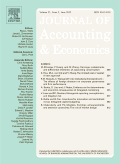
JOURNAL OF ACCOUNTING & ECONOMICS
Championing Rigorous Research in Finance and Accounting.JOURNAL OF ACCOUNTING & ECONOMICS, published by Elsevier, is a leading peer-reviewed journal in the fields of accounting, economics, and finance, providing a vibrant platform for the dissemination of groundbreaking research since its inception in 1979. With an impressive impact captured in its Q1 rankings across its categories—Accounting, Economics and Econometrics, and Finance—the journal ranks #11 in Accounting, #30 in Finance, and #73 in Economics according to Scopus. It serves as an essential resource for researchers, professionals, and students alike, fostering a deeper understanding of economic principles and accounting practices while promoting innovative methodologies and theories. Although it does not offer direct open access, the journal is committed to academic excellence and rigorous peer-review standards, ensuring that published works contribute significantly to the body of knowledge in its respective fields. With its address in Amsterdam, Netherlands, the journal invites contributions from scholars worldwide, emphasizing its international reach and impact.
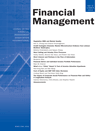
FINANCIAL MANAGEMENT
Transforming Financial Practices Through Rigorous ResearchFINANCIAL MANAGEMENT is a premier academic journal published by Wiley, focusing on the intricate domains of Accounting, Economics, and Finance. With an ISSN of 0046-3892 and an E-ISSN of 1755-053X, this esteemed journal has made significant contributions to the global discourse on financial practices and theories since its establishment in 1996. Situated within the top tier (Q1) in its respective fields, FINANCIAL MANAGEMENT ranks impressively in Scopus, positioned at 30 out of 176 in Accounting and 57 out of 317 in Finance, reflecting its high impact and relevance in the scholarly community. The journal is known for its rigorous peer-review process and publishes cutting-edge research aimed at advancing knowledge and practice in financial management. Although it does not offer Open Access, it remains accessible through institutional subscriptions, ensuring that researchers, professionals, and students remain at the forefront of developments in financial management. With a commitment to excellence, FINANCIAL MANAGEMENT continues to be an indispensable resource for those seeking to deepen their understanding of this critical field.
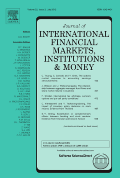
Journal of International Financial Markets Institutions & Money
Shaping the Future of Financial Markets and InstitutionsThe Journal of International Financial Markets, Institutions & Money, published by Elsevier, serves as a leading platform for the dissemination of high-quality research in the fields of finance, economics, and econometrics. With an impressive impact factor reflected in its status as a Q1 journal in both categories for 2023, it ranks among the top journals, positioned at #47 out of 317 in Finance and #111 out of 716 in Economics. This journal offers a unique focus on the interplay between financial markets and institutions on a global scale, making it an essential resource for scholars, practitioners, and students alike. The journal welcomes innovative theoretical, empirical, and applied research, contributing to an exciting dialogue that shapes the future of international finance. For researchers looking to publish their findings, this journal is committed to rigorously engaging with contemporary financial phenomena, positioning itself as a vital cornerstone of academic and professional discourse.
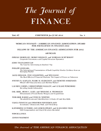
JOURNAL OF FINANCE
Leading the way in financial theory and practice.JOURNAL OF FINANCE, published by Wiley, stands as a premier academic journal in the fields of finance, economics, and accounting. With a history dating back to 1946, the journal has consistently delivered impactful research that shapes financial theory and practice, boasting an impressive impact factor reflective of its high citation rate. Its Quartile 1 ranking in Accounting, Economics and Econometrics, and Finance illustrates its leading position within these disciplines. Although not an open access publication, the journal continues to be indispensable for researchers, professionals, and students seeking to advance their understanding and knowledge through rigorous empirical analysis and comprehensive reviews. With an esteemed global readership, the JOURNAL OF FINANCE remains committed to fostering the dissemination of innovative financial research well into 2024 and beyond.

International Review of Finance
Innovating discourse in the realm of finance research.International Review of Finance is a prestigious academic journal published by Wiley, located in the United Kingdom. With its ISSN 1369-412X and E-ISSN 1468-2443, this journal serves as an essential platform for researchers and practitioners in the fields of Economics and Finance. Ranked in the Q2 quartile for both Economics and Econometrics and Finance as of 2023, it showcases high-quality research that contributes significantly to theoretical and practical advancements. Reflecting its standing, the journal is positioned in the 61st percentile in Economics and Econometrics and the 60th percentile in Finance according to Scopus rankings. The scope of the journal includes a diverse range of topics, encouraging innovative discourse across various financial disciplines. Although it does not offer open access, the International Review of Finance continues to be an important resource for academics, professionals, and students seeking to deepen their understanding of evolving financial theories and practices.
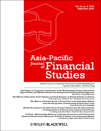
Asia-Pacific Journal of Financial Studies
Exploring the Dynamics of Finance in the Asia-Pacific RegionAsia-Pacific Journal of Financial Studies is a premier academic journal published by WILEY, dedicated to advancing the field of finance within the dynamic Asia-Pacific region. With an ISSN of 2041-9945 and an E-ISSN of 2041-6156, this journal stands out for its rigorous peer-reviewed research spanning various topics in finance, making it a vital resource for researchers, practitioners, and students alike. It has achieved an impressive Q2 ranking in Finance as of 2023, placing it within the top half of finance journals as measured by its relevance and quality of contributions in the Scopus Economics, Econometrics and Finance category. Additionally, the journal supports researchers with robust access options, promoting broader dissemination of knowledge. Its dedicated focus from 2006 to 2024 highlights the journal's commitment to continuous scholarly exchange and innovation in financial studies. As it thrives in the competitive landscape of scholarly publishing, the Asia-Pacific Journal of Financial Studies not only enriches academic discourse but also informs practices that shape financial markets and policies in the region.
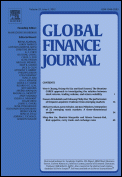
Global Finance Journal
Exploring the dynamics of economics and finance.Global Finance Journal is an esteemed periodical published by Elsevier, dedicated to the dynamic fields of finance and economics. With an impressive history spanning from 1989 to 2024, this journal holds a significant position in the academic community, boasting a Q1 quartile ranking in both Economics and Econometrics, as well as Finance, as of 2023. It is highly regarded in Scopus rankings, placing 40th out of 317 in Finance and 99th out of 716 in Economics and Econometrics, demonstrating its influence and reach among researchers and practitioners alike. Although not an open-access journal, the Global Finance Journal provides rigorous peer-reviewed articles that explore critical issues, advance theoretical frameworks, and address practical applications in global finance. As such, it serves as a vital resource for researchers, financial professionals, and students aiming to deepen their understanding of economic phenomena and contribute to the ongoing discourse in these vibrant disciplines.
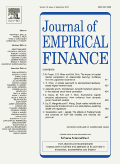
Journal of Empirical Finance
Advancing empirical insights for a dynamic financial landscape.Journal of Empirical Finance, published by Elsevier, stands as a key resource in the areas of finance and economics, with a definitive focus on empirical studies. As a prominent journal since its inception in 1993, it has made significant strides in contributing to the academic community, evidenced by its soaring categorization in Q1 for Finance and Q2 for Economics and Econometrics as of 2023. With an ISSN of 0927-5398 and an E-ISSN of 1879-1727, the journal emphasizes robust, data-driven analysis to inform both theoretical and practical aspects of financial research. While access options do not include open access, the journal ensures that its content remains accessible to a diverse audience of researchers, professionals, and students. It fosters a platform for innovative research and discourse, significantly impacting the fields of finance, economics, and econometrics. The Scopus rankings further bolster its reputation, placing it in the 61st percentile in both categories, reflecting a commitment to high-quality research output. As the journal continues to evolve, it invites contributions that push the boundaries of empirical finance, enabling a deeper understanding of financial mechanisms that drive global economies.

Abacus-A Journal of Accounting Finance and Business Studies
Elevating Scholarly Research in Business StudiesAbacus: A Journal of Accounting Finance and Business Studies, published by WILEY, stands as a prominent platform dedicated to advancing the fields of accounting, finance, and business studies. With a history dating back to 1965, this journal has consistently delivered high-quality research and insights, culminating in its current status as a Q2 journal in Accounting according to the 2023 category quartiles. Operating from the United Kingdom, Abacus provides essential scholarly content for researchers, practitioners, and students alike, aiming to bridge the gap between theory and practice in its diverse sub-disciplines. Although it does not currently offer open access, its reputation is underscored by a solid Scopus ranking of #83/176 in the field of Accounting, representing the 53rd percentile for quality and impact. With its continued focus on innovative research, Abacus remains a crucial resource for anyone looking to navigate the evolving landscape of accounting and finance.

International Journal of Financial Studies
Empowering finance research through open access.The International Journal of Financial Studies is a premier publication dedicated to advancing the field of finance through open-access research. Published by MDPI based in Switzerland, this journal offers researchers, professionals, and students a platform to disseminate their findings in an accessible format since its establishment in 2013. With its ISSN of 2227-7072 and a commendable impact reflected in its Q2 ranking in finance, it occupies an influential position among finance-related journals, as evidenced by its 65th percentile rank in Scopus. The journal encompasses a wide array of topics in finance, making it essential reading for those seeking to stay abreast of current research trends and methodologies. As an open-access journal, all articles are freely available, significantly enhancing the visibility and reach of published studies, which is crucial for fostering collaboration and innovation within the global financial community. Published continuously until 2024, the International Journal of Financial Studies is not just a source of knowledge; it is a critical contributor to the progression of financial scholarship.